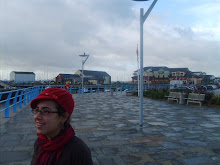Being in Sicilia is a little like going back in time. Somehow the whole country feels like a small town, and when you walk down the street, even in cities--Palermo being the only possible exception--people say ciao and smile. In train stations, and on trains, strangers chat. I have barely paid for food or coffee since I arrived because everywhere I go I am either offered half of someone's lunch or invited home for dinner. And you can't say no to Italians or Sicilians because when it comes to food, they are about the most stubborn and most generous people you can meet. Another reason it is a time warp is because it is traditional and patriarchal. In the piazzas, it is mostly men sitting around, smoking cigarettes and yelling at one another. It is not so strange for women to sit in the piazza, but mostly they don't. I make note of this because the piazza is the center of the town, socially, and commerically. Also, I'm not sure about this, but I think Sicily is the only place in Europe where you can still walk over rubble from World War II. Not far from the airport no less. They just haven't cleaned it up yet. You can still walk over WWII rubble, yet there are more windmills in Sicily than in the whole northeast of the US. And, in addition to contemporary windmills, there are homemade windmills that look like they've been around since before windmills were popular. In fact, they look like they've been around since World War II.
Race is really complicated and confusing here. On the one hand, a lot of Italians and Sicilians say openly racist things about black Italians, and African immigrants (of which Italy has a growing population). This is especially true in the south of Italy and in Sicily. Meanwhile, in the north, there is a very unsubtle racism against southern Italians, Sardignians, and Sicilians. And you would think that this would mean these groups stick together. Yet Sicilians are looked down upon by some southern Italians. And Sicilians refer to Italy as "the continent." They have a separate identity, with a separate language. I also met some very openminded Neapolitans and Sicilians who all said that north is the most openminded and least racist part of the country. The north, by the way, is whiter, but also richer and this makes me think that the tension between the north and the south is really more of a class question. But who knows. And another possibility is that northerners are 'less racist' because they live in a place that is much more homogenous than the south. And it is like this--it is very easy to claim not to be racist when you never see anyone who looks any different from you. I've met a few Europeans who criticize the US for all our race problems, and then say something like, "Oh, watch your bag in on this street. This is where the Tunisian immigrants live." And when I challenge them on this comment, they say something like, "Oh, it's not their fault, because their lives are hard, but it's true that they steal." It amazes me. So I really don't know. I really don't understand how people think about race here.
And, in regard to the US, and race, there is an interesting conversation that repeats itself. It happens when my non-Italiana identity is discovered and goes something like this:
"Di dove sei? Siciliana? Italiana?"
"No, sono Americana."
"Americana! Ahhhh...Stati Uniti..bella. New York-a. I love-a New York-a."
(me smiling)
"Obama, I love Obama. I love US!"
The conversation might continue in other directions, or not, and then, for example, I am not allowed to pay for my coffee. Just as an example. When Bush was in office, and I was in South Africa, there was a prominant dislike of America in the world. I (somewhat consciously, and somewhat unconsciously) developed what I will refer to as a pan-world accent, and hid my own accent underneath, like a secret current. By the time someone I was chatting with discovered I was American, they already liked me and it was too late for them to judge me based on my citizenship. I think it's odd that it is the likeability of our leader that has such an effect on how we are perceived as a country (rather than his policies). I agree that Obama is a great improvement from Bush, and a step in the right direction for our country, but the people who exclaim so zealously that they love Obama usually haven't examined what he is doing. Nor have they questioned what on earth he did to receive a nobel peace price (....?)
The only good part of all of this, although it is the sad part too, is that it may be changing the way Europeans think about race. I met a very thinky--beyond intelligent, a person who knows how to engage, heart and soul and brain--young Sicilian guy who said that Obama is changing the way Sicilians percieve black people. In his words: "Because Obama is handsome and elegant and in charge of the most powerful country in the world." But does Obama really change how Sicilians treat and think about immigrants, or just change the way they think about America?

No comments:
Post a Comment